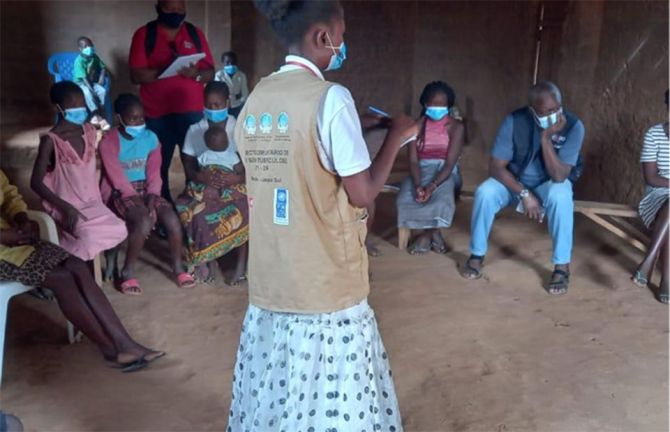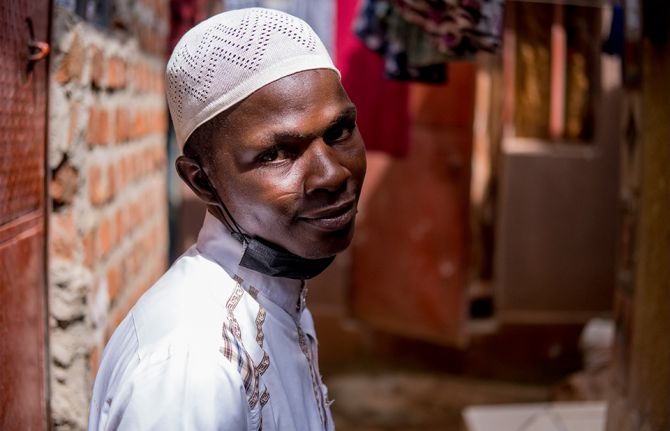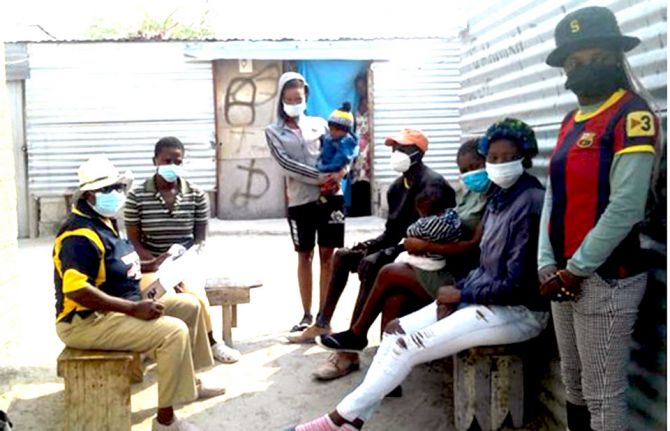
Feature Story
Getting support for HIV and mental health in Africa
02 февраля 2008
02 февраля 2008 02 февраля 2008
Frank Njenga, President of the African
Association of Psychiatrists and Allied
Professions presents alongside Joseph
Mbatia Director of Mental Health, Ministry
of Health, Tanzania.
Research shows that 89% of AIDS related home based care givers in the North West Province and Mpumalanga in South Africa were depressed or showed signs of depression. The research was presented at the recent World Federation for Mental Health expert forum convened in Cape Town, South Africa, on 29-31 January 2008.
The study conducted by the South African Depression and Anxiety Group and Wits University South Africa was one of several examples of the growing need for increased access to mental health care for people infected and affected by HIV.
"It is clear from our grassroots partners and members that there is demonstrated need for strengthened mental health services addressing stress management, social support and self-esteem among people living with and affected by HIV”, said the Secretary General of the World Federation for Mental Health, Preston Garrison. “Caregivers in particular, experience high levels of stress and their role can take a substantial mental health and physical toll as they care for the physical, emotional and economic needs of their family members,” he added.
World Health Organization consultant Melvyn Freeman referenced a study in Zambia that showed 85% of pregnant women diagnosed HIV positive had episodes of major depression and many had suicidal thoughts. Another study revealed an increase in depression and suicide among AIDS orphans in East and Southern Africa.

World Federation for Mental Health forum
brought together 23 leaders from different
specialties within the AIDS and mental
health fields, to explore mental health
needs for all aspects of the AIDS response.
The forum, supported by the Ford Foundation brought together 23 leaders from different specialties within the AIDS and mental health fields, to explore mental health needs for all aspects of the AIDS response. Particular attention was given to the needs of care givers, people living with HIV and vulnerable children - groups identified as often experiencing the most significant mental health challenges as a result of AIDS.
The Cape Town forum was convened in part thanks to the advocacy of national level organizations such as the Zimbabwe National Association for Mental Health which has continually pushed to raise awareness of the need for increased mental health support services for caregivers of people living with AIDS and for children who are orphaned when their parents die of AIDS.
In a key note presentation at the meeting Frank Njenga, President of the African Association of Psychiatrists and Allied Professions, offered an overview of the status of mental health in Africa emphasizing how the trauma of AIDS experienced by individuals, families and communities has significantly increased the need for an urgent scale-up of comprehensive mental health services that work in collaboration with national and local AIDS programmes.
A series of roundtable discussions explored gaps in mental health that need to be addressed in order to optimize the well-being of people infected or affected by HIV in Africa. Among the issues considered was the need to better understand how mental health problems increase the vulnerability of individuals to HIV infection and the need to train health care workers in order to reduce the mental health and HIV related stigma.

Julian Sturgeon, National Manager of the
Treatment Action Campaign , highlighted
the work of the organization's treatment
literacy programme designed to ensure
optimum adherence to treatment among
people living wtih HIV.
It was also highlighted by the participants that any new intervention should seek to support the greater empowerment of people with mental health problems to respond to their own HIV needs.
Furthermore, participants also underlined the need for a greater standardization of mental health and well being programmes to strengthen the many community based initiatives already focused on psycho-social support.
"The relationship between HIV, mental health and the pursuit of well-being is multi-layered and offers many opportunities for strengthening, scale-up and increased collaboration,” said Andy Seale, UNAIDS Senior Advocacy Adviser, East and Southern Africa Region. “Many aspects of HIV-related mental health needs have been addressed at the community level for years. However, local needs - particularly of people living with HIV and those with an increased care burden - are often inadequately addressed and programmes remain under resourced and could benefit from increased international support and advocacy,” he added.
In conclusion, it was agreed to move forward in mobilizing an Africa-wide initiative to address the complex and multiple interactions between mental health and AIDS through a focus on community-level mobilization.
The initiative will seek to mobilize further interest at the African Psychiatric Conference to be held in Ghana in April 2008, compile an online directory of joint HIV and mental health resources, develop a series of policy papers and information packs for key workers, and convene a partners' conference in early 2009 exploring the mental health consequences of AIDS for people living with HIV, their families, caregivers and communities.



